There are a few key foods to avoid with juniper allergies. But, avoidance can be tricky to deal with, as the juniper plant is used in a variety of foods and drinks. In this article, we’ll take a closer look at juniper allergies and what you should avoid in your diet.

What is Juniper?
Juniper is a type of evergreen shrub or tree that is native to Europe, Asia, and North America. The plant is often used to flavor foods and drinks, and the juniper berries are commonly used to make gin.
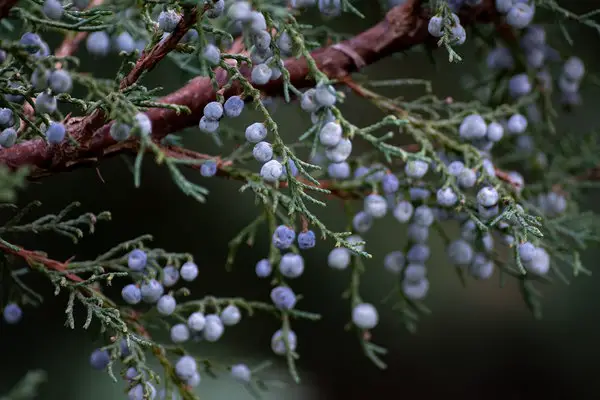
Juniper berries have a slightly sweet and spicy flavor, and they’re often used in marinades, sauces, and rubs for meat as well.
Juniper Allergies
Exposure to juniper can occur through various means, including inhalation of pollen from the tree during the spring or summer months, consumption of foods that contain juniper berries or related plant species, or direct contact with juniper tree bark or sap.
Symptoms of Juniper Food Allergies

If you’re allergic to juniper, you may experience a range of symptoms, including:
- Hives or a rash
- Swelling of the face, lips, or tongue
- Itching or tingling in the mouth
- Nausea or vomiting
- Difficulty breathing
- Anaphylaxis (a severe allergic reaction)
If you experience any of these symptoms after consuming juniper berries, or foods that contain juniper, you may have a food allergy, and it’s important to seek medical attention right away.
Foods and Drinks to Avoid with A Juniper Allergy
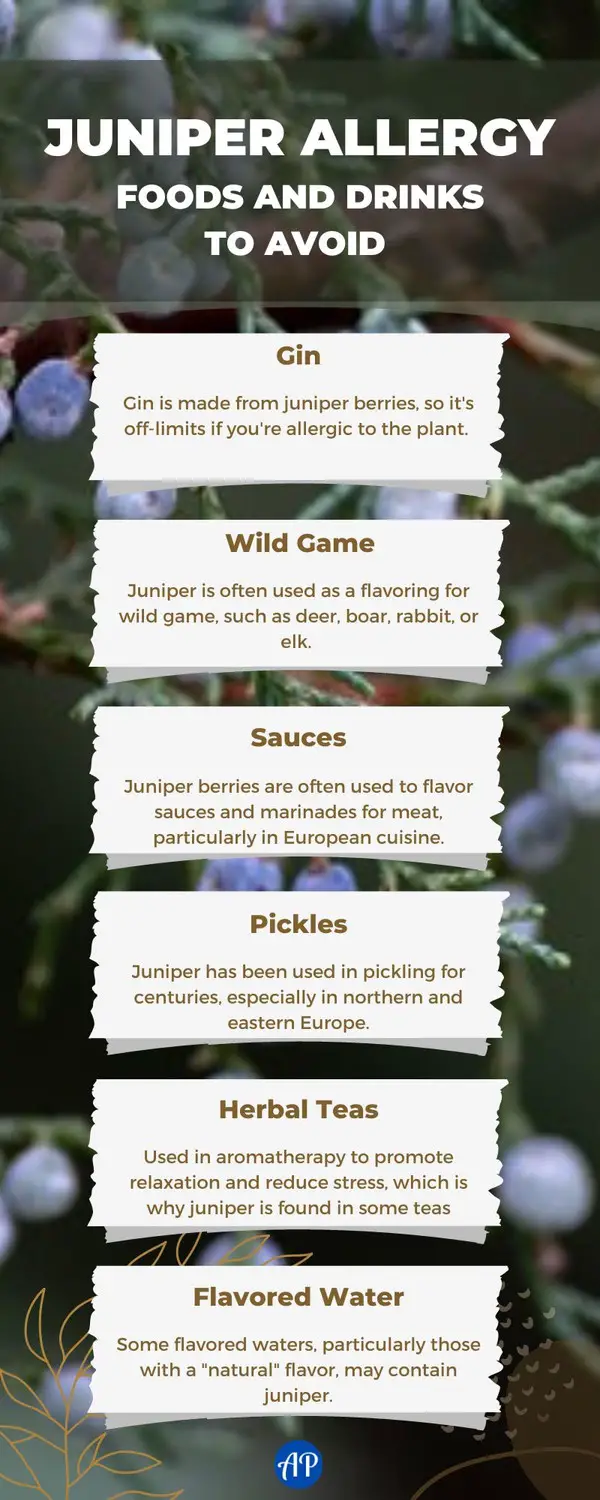
If you’re allergic to juniper, there are several foods and drinks that you should avoid. These are the foods and drinks that typically contain juniper berries to give them that unique juniper flavor.
Gin
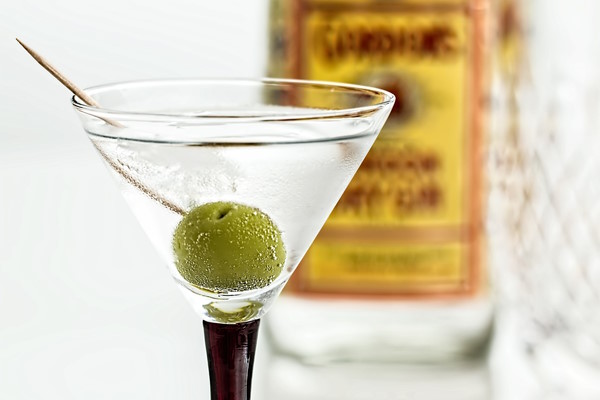
Gin is made from juniper berries, so it’s off-limits if you’re allergic to the plant. You should choose alternative beverages that do not contain juniper, such as vodka, rum, or tequila.
Wild game
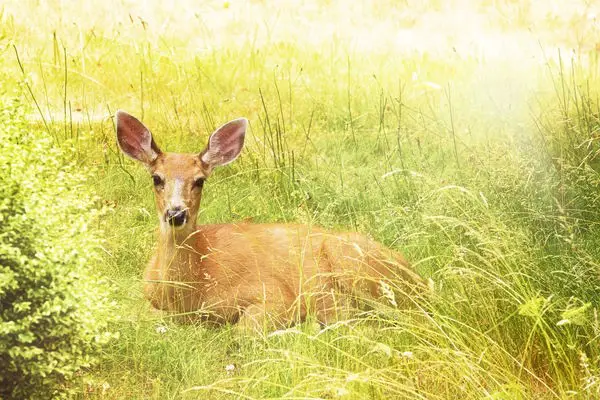
Juniper is often used as a flavoring for wild game, such as deer, boar, rabbit, or elk. Additionally, some types of wild game may feed on juniper berries in the wild, which may also cause some issues when consuming.
Sauces and marinades
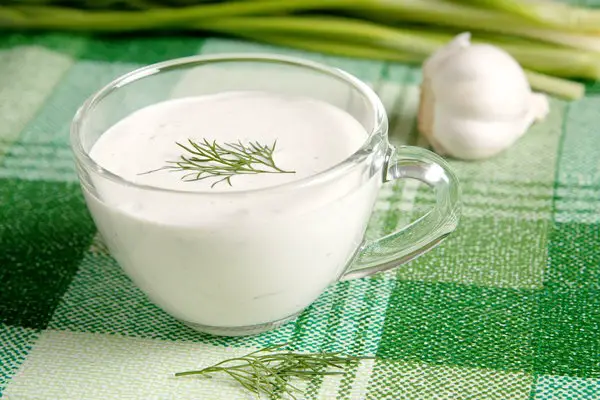
Juniper berries are often used to flavor sauces and marinades for meat, particularly in European cuisine. Some sauces that commonly contain juniper include wild game sauces, gin-based sauces, and berry sauces.
Pickles
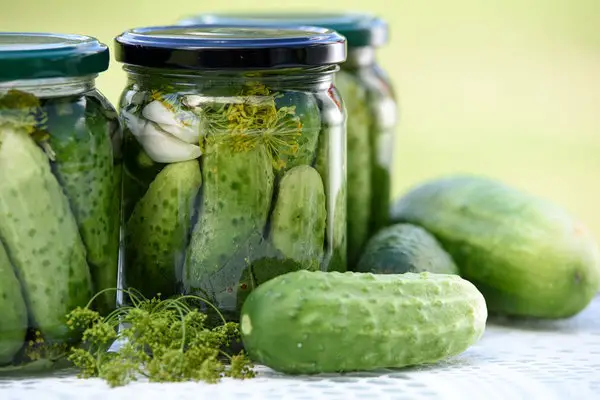
Juniper has been used in pickling for centuries, especially in northern and eastern Europe. Juniper berries have a distinctive, piney flavor that can add complexity and depth to pickle brine. Be sure to read the label before consuming them.
Herbal teas
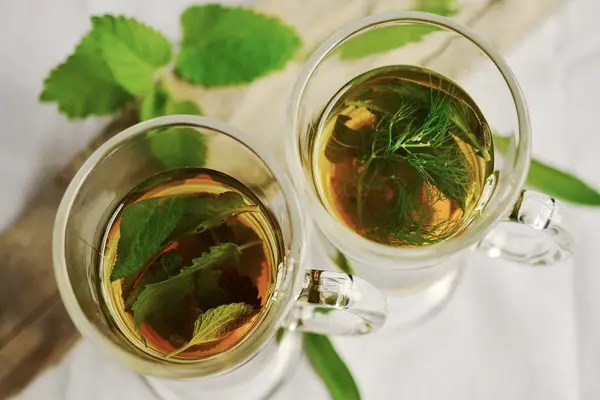
Juniper has a fresh, invigorating scent that can be used in aromatherapy to promote relaxation and reduce stress, which is why juniper is found in some teas. If you have a juniper allergy, this can be problematic. Ensure you read the ingredients label before drinking teas.
Flavored water

Some flavored waters, particularly those with a “natural” flavor, may contain juniper. Juniper berries have a unique, slightly bitter flavor that can add a distinctive taste to flavored water. This flavor is especially complementary to other botanical or citrus flavors, such as lemon or grapefruit.
Alternatives to Juniper Berries
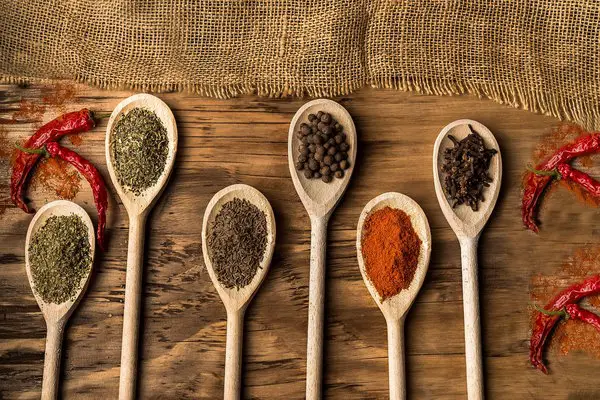
Avoiding juniper in your cooking may be difficult, especially if you love the taste. If you’re allergic to juniper, you may be wondering what alternatives you can use to flavor your food and drinks. Here are the best substitutes for Juniper Berries:
- Bay leaves
- Black pepper
- Caraway seeds
- Cardamom
- Cranberries
- Hickory spice
- Pinewood
- Rosemary
Tips for Avoiding Juniper in Foods
If you’re allergic to juniper, it’s important to be vigilant about what you eat and drink. Here are a few tips for avoiding foods when you have a juniper allergy.
Read food labels carefully

The best way to avoid juniper is to make sure to read the ingredients list on all foods and drinks before consuming them. If the food does contain juniper berries, it should read either “juniper berries”, “juniper oil”, or “juniper extract”.
There is no way to know for sure, but juniper can be in the ingredients listed as “natural flavor”, so proceed with caution.
Ask your server about the ingredients

If you’re eating out, don’t be afraid to ask your server about the ingredients in a dish. Be kind, but direct with the Chef or server when asking about the ingredients.
A simple “Hi, I am thinking of ordering the (insert name of the dish), but I have a juniper allergy. Do you know if this dish is prepared with juniper?”
Cook at home

Cooking at home can give you more control over what you’re consuming, and is the best way to know for sure that you are avoiding juniper berry seasoning.
Cooking at home to avoid juniper works best when you use ingredients that are fresh, and not prepackaged. Prepackaged foods may still have juniper in the ingredients, so make sure you are reading those labels.
Juniper allergies can be tricky to deal with, but with a little knowledge and some careful planning, it’s possible to avoid the allergen and still enjoy a wide variety of foods and drinks.
What happens if I keep consuming foods I am allergic to?
If you continue to consume foods you are allergic to, you could make your symptoms worse, or develop new food allergies. It is in rare cases that your food allergy symptoms become better.
See Also: Juniper Allergies: Facts, Symptoms, Treatments & Prevention
FAQs on Juniper Allergies
Can juniper allergies be treated with medication?
There is no cure for allergies, but there are medications available that can help manage symptoms. Antihistamines and decongestants can help relieve symptoms like itching and congestion, while epinephrine auto-injectors are used in cases of severe allergic reactions.
Can a juniper allergy develop later in life?
Yes, it’s possible to develop an allergy to juniper later in life. Allergies can develop at any time, even if you’ve never had a reaction to the allergen before.
Is it safe to consume foods that contain “natural flavor”?
Not necessarily. “Natural flavor” is a broad term that can refer to a wide variety of ingredients, including juniper. It is best to avoid “natural flavors” with food allergies.
Can I still drink alcohol if I’m allergic to juniper?
It depends on the type of alcohol. Gin is made from juniper berries, so it’s off-limits. Other types of alcohol, like wine and beer, may be safe. Read the labels and contact the manufacturer about their ingredients to be sure.
What should I do if I accidentally consume juniper?
If you accidentally consume juniper and experience symptoms of an allergic reaction, seek medical attention right away. If you have an epinephrine auto-injector, use it as directed.
What happens if I keep consuming foods I am allergic to?
If you continue to consume foods you are allergic to, you could make your symptoms worse, or develop new food allergies. It is in rare cases that your food allergy symptoms become better.

